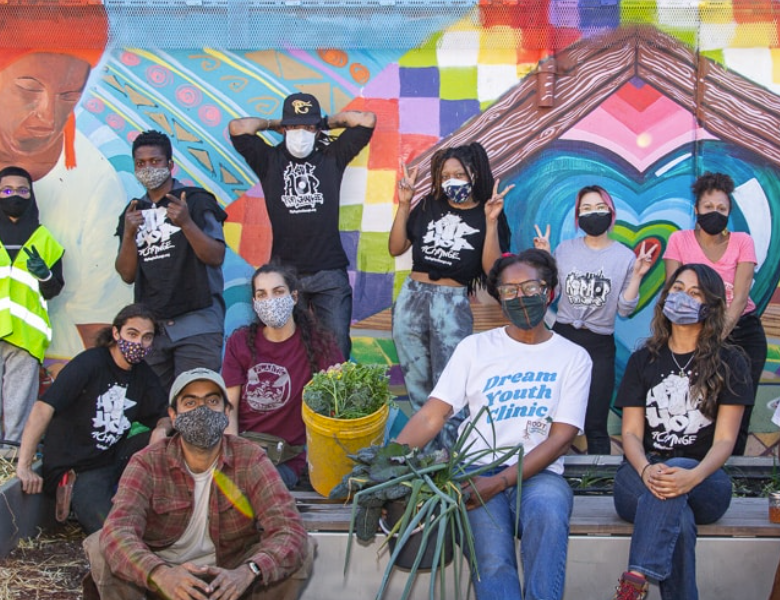What is food justice ft. planting JUSTice
Image from plantingjustice.org
Here is some food for thought. About 20% of Californians are facing food insecurity. Our agricultural practices are harming our planet, putting profit before people. Our farmworkers are struggling to make ends meet with their low wages. Given all of this, what does food justice mean to you, and how do we achieve it?
This semester, our theme at EthiCal is Food For Thought. As we work towards the effort of food justice, we as a club have been thinking about the question, “What does food justice really mean?”. I contacted Mark Fujiwara, grant writer, and farm steward of our partner organization, Planting Justice, to gain more clarity on this issue. Planting Justice is a 501(c)3 non-profit organization focusing on achieving food justice by addressing structural inequalities embedded in the industrialized food system –– this includes the systemic exploitation of food system workers, lack of access to nutritional food in low-income communities of color, and the food production which is toxic to our people and planet.
When conversing with Mark about food justice, he made it clear that the issues our communities face surrounding food are systemic. You may have heard of the term “food deserts” when referring to geographical areas that face difficulties in buying affordable or good quality food. In spite of this, Mark claims that using the term “food deserts'' is not accurate. He explained to me that deserts are natural occurrences created by nature. However, food deserts aren’t natural. Food deserts are created through systemic problems, such as grocery stores’ reluctance to establish business in low-income communities, and inadequate access to transportation in rural areas. Therefore these food issues pertaining to marginalized groups of people should be referred to as “food apartheid” as “apartheid” implies that there is a maintenance in a system that deprives these communities of basic human rights.
To Planting Justice, food justice is about food sovereignty, economic justice, and community healing. In other words, food justice is about centralizing community and decentralizing big corporations. During our conversation, Mark emphasized that it doesn’t take much to achieve food justice. He explained to me that there are policies and choices involved in how people create and access food, which, as it stands currently, is very inefficient for the well-being of all communities. He illustrated this by highlighting how California exports and supplies food nationally and internationally, making farming very ethically inefficient. For example, why does California grow water-sucking alfalfa to feed cattle when California faces drought issues? A more ethical and efficient approach would be to produce it in the Midwest, where the environment is more well-suited for this form of production. This example shows how current food production affects the community's environment, which consequently affects communities as we’ve seen through California’s drought issues. An example of centralizing people for food justice is by having community gardens and practicing urban farming. Through these practices, food accessibility would expand, as the gardens are being implemented in communities, providing fresh and local produce. This solution would also improve the quality of the environment by cleaning the air.
Planting Justice addresses these systemic flaws by building over 450 edible gardens throughout the Bay Area, empowering communities to grow their own food. These urban farms are building green jobs by providing fair wages with benefits to folks in the Bay Area. Planting Justice does many things to centralize community well-being, especially by uplifting marginalized communities. From hiring formerly incarcerated people, to providing gardens in communities that face “food apartheid”, Planting Justice has shown that food justice is about community healing.
So how can we work towards food justice? Mark expresses that food justice starts by questioning the produce we consume. Something we all can do is communicate to our grocery stores about the importance of local produce availability. We can also contribute to this effort by supporting local farmers through sites like Facebook Marketplace or Farmer’s Markets. Another way is to use your voice to advocate and vote in favor of farmworkers' rights. Your voice matters!!
Additionally, food justice can prevail when we support each other and those doing the work. We can support Planting Justice in many ways. You can check out their website to find opportunities for volunteering in the urban farms as well as donate to them by clicking this link. If you’re planting your own garden, make sure to support their nursery by getting your plant babies from them. You can also financially show support to Planting Justice by supporting EthiCal Apparel. 60% of our proceeds this semester will be allocated to supporting Planting Justice to keep fighting towards food justice. Through collective work and loving support, we can work our way towards food justice!


